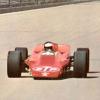I was reading about the Awesome Brabham BMW Turbo cars from the mid 1980`s that were putting out over 1,200 for Qualifying. My question is would that all the Horsepower be useful for top speed only ? Someone in another forum says the Turbo F1 cars were only about Top Speed and that they had " Terrible " Acceleration compared to modern F1 cars.
Horsepower, Torque, and Acceleration
Started by
McLaren M20
, Apr 30 2003 22:23
5 replies to this topic
#1

Posted 30 April 2003 - 22:23
Advertisement
#2

Posted 01 May 2003 - 05:12
Regarding your comments about terrible acceleration. I think that you may be refeing specifically to the acceleration of the Brabham BT55, which was known to have poor acceleration compared to its competitors. I think this had something to do with with the huge single turbo and the very inclined nature of the engine meaning the inlet tracts were at an odd angle, thus creating a dead team before the turbo 'spooled up'. I find it hard to believe a car with 1200 hp could have poor acceleration especially at low speads, where drag was less of a factor.
#3

Posted 01 May 2003 - 07:35
Unlike normally aspirated engines, where power is (roughly) just proportional to engine revs, the turbocharged engine has a power curve which depends on turbo revs as well. Because engine revs and turbo revs are independent, there's always a delay before the turbo "spools up," and it takes a little while before the turbo power kicks in.
#4

Posted 11 May 2003 - 01:31
I've heard that these cars actually accelerated quicker from 100-200km/h than from 0-100km/h!
#5

Posted 12 May 2003 - 11:19
Originally posted by ozF1er
I've heard that these cars actually accelerated quicker from 100-200km/h than from 0-100km/h!
Yes but that´s the same today. 0-100km/h in 2.5-2.6 seconds and 0-200km/h in about >4 seconds for an modern F1.
From 320 km/h down to 0 takes less than 2 seconds...
#6

Posted 13 May 2003 - 13:23
Originally posted by Fortymark
From 320 km/h down to 0 takes less than 2 seconds...
I doubt it. It would correspond to an average deceleraction exceeding 4.5g, which is usually quoted as near peak decelaration at top speed (Peter Wright's book).
Even with tyres having a friction coefficient of 2+ (Peter Wright again), it would take some 0.7 seconds alone to stop from 50 km/h (in a distance of 5 m!), as downforce is not very significant at such low speeds; the possible deceleration is then limited by the friction coefficient to 2g.
So, is it possible to brake from 320 km/h to 50 km/h in 1.3 seconds? The average deceleration must then be near 6g...
Measurements in a plot in Wright's book indicate 4.5g peak and 3g typical. If we assume 3g average deceleration, 320 km/h down to 0 takes 3 seconds. That's still very impressive.












